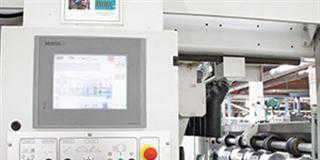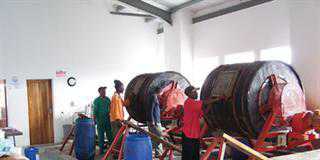
What are the local industry’s main challenges?
Seed potatoes are grown under the SA Seed Potato Certification Scheme, which is promulgated under the Plant Improvement Act 1976 (Act no. 53 of 1976). The scheme deals with the phytosanitary status of seed potatoes in terms of variety and purity. Diseases such as potato cyst nematode (PCN) and bacterial wilt are so damaging that they necessitate quarantine conditions. If either of these diseases is detected on a land, growers may not plant any potatoes or host plants there for a minimum of eight years.
READ:Soldier, sportsman and legendary farmer
Soil and tuber-borne diseases are likely to increase as growers return to ‘old’ soils infected in previous plantings. It also becomes increasingly difficult to grow seed potatoes with low virus infections in areas where more commercial potatoes than seed potatoes are grown. Growing seed potatoes with low disease incidence requires efficient crop rotation and isolation, pest and disease management, and the use of certified seed potatoes.
Another factor that has an impact on the industry is the availability of varieties with plant breeders’ rights. Some are grown under contractual agreements that stipulate whether the seed may be used for commercial production only, or may be propagated as seed. Growers may plant only certified seed.
The increased planting of uncertified seed potatoes is a major problem, not only for local producers but also for plant breeders who then cannot collect royalties on these varieties. According to Potatoes SA, about 29% of all seed potato plantings in South Africa come from uncertified seed. This is mainly due to commercial farmers holding back the certified seed they have bought for another planting to reduce costs. Seed represents farmers’ greatest input cost.
Due to increases in other input costs such as fuel, electricity and labour, the return on investment for some growers does not justify the risks associated with production. Biosecurity is another important factor. Pests and diseases that can have a devastating impact on the industry as potatoes are propagated vegetatively.
Diseases such as Zebra Chip, Dickeya solani, Clavibacter michiganensis, Phytophthora infestans mating type A2, and many others do not occur in South Africa yet and it is vital to keep the industry free of these. On a political level, farmers face land reform, as well as safety and security challenges, making farming increasingly difficult.
Is it necessary for South Africa to import seed potatoes?
No seed potatoes are imported, but we do import in vitro and mini-tuber material (G0 seed potatoes), mainly from Europe.
In vitro plants are imported from breeding organisations as gene bank material and mini- tubers are imported to speed up the evaluation of newly-bred potato varieties. There is, however, a high phytosanitary risk associated with seed potatoes that have not been cultivated in a closed environment.
In South Africa, mini-tuber production has increased from 4,5 million in 2003/2004 to over 10 million in the last three years.
Because mini-tubers are the base material for all seed potato production, this increase has resulted in more seed potatoes being sold as earlier-generation seed. In 2003/2004, Generation 1 to 4 seed potatoes formed 56% of overall production and today this figure is 78%.
What are the main cultivars produced by local producers?
Mondial is the main cultivar produced in South Africa at 38%, Sifra is second at 19,45% and Valor third at 4,46%.
Mondial is popular due to its high yield and excellent scab resistance.
Is any research being done on seed potatoes in South Africa?
The Agricultural Research Council’s Institute for Vegetable and Ornamental Plants (ARC-VOPI) has a potato breeding programme. At present, the only South African-bred potato cultivar still planted on a commercial scale is Darius, which makes up 0,8% of production. It was bred by Arno Visser at ARC-VOPI.
Currently, some promising breeding lines are being evaluated for commercialisation. Potatoes SA also has an extensive research programme, and although not many projects specifically focus on seed potato production, the industry benefits indirectly from all research, including pest and disease control, climate change, conservation, post-harvest technology, soil health, irrigation scheduling, and groundwater use.
Research projects that directly benefit seed potato growers, are the development and validation of the polymerase chain reaction (PCR) as a test method for the certification of seed potatoes, control of volunteer potatoes, aphid monitoring, and various virus research projects.
What opportunities exist for local seed potato producers?
South Africa has an excellent certification scheme that compares well with international schemes. The high quality of our seed potatoes make them highly sought-after, which presents a good export opportunity to neighbouring states and other African countries. There is also an increased demand for potatoes for processing, while the fact that 29% of potato seed planted in South Africa is uncertified is an opportunity in itself.
How would the introduction of a 14% VAT rate affect the seed potato industry?
Doing away with VAT zero-rating on seed potatoes could have significant negative consequences for potato production in South Africa. It will also have an impact on the availability of locally produced, affordable and nutritious potatoes for consumers. In short, it will threaten local food security. Because potatoes can be classified either as planting material or consumable foodstuffs, they are treated differently in terms of tax legislation. Potatoes are propagated vegetatively using seed potatoes, but the latter do not differ from normal potatoes in appearance.
In addition, South Africa’s certification scheme is not compulsory, which therefore allows for trade in uncertified seed potatoes. The ultimate goal is to achieve a 100% planting rate using only certified seed potatoes. Planting uncertified potatoes as seed presents a huge risk of transmissible diseases, as well as the occurrence of quarantine organisms such as Ralstonia solanacearum, which causes bacterial wilt disease. This results in an unmarketable crop and the soil having to be taken out of the system for a minimum of eight years.
If 14% VAT is levied, there is a greater risk that seed will be sold uncertified, because potatoes for consumption are zero-rated.
Certified seed potatoes qualify for the VAT zero-rating if delivered to bona fide farmers with documentary proof that they qualify to acquire the goods at the zero rate.
Certified seed potatoes are the source of good quality planting material, not only for South Africa, but also the continent. Any threat to the SA Potato Certification Service as a company will not only place good quality planting material, but also South Africa’s biosecurity, at risk. The SA Potato Certification Service plays a pivotal role in protecting the SA potato industry against imported, potentially harmful organisms, which can also have a negative impact on international trade.
What are the best- and worst-case scenarios for the industry in the next 10 years?
The best case would be for all potato plantings in South Africa to be from certified seed potatoes. This will ensure profitable potato production, resulting in food security and healthy citizens enjoying potatoes in all forms. Growing the export market will also increase the profitability of seed potato production.
A worst-case scenario would be an increase in the planting of seed potatoes with unknown pest and disease status, which could lead to a serious outbreak of diseases such as potato leaf roll virus or bacterial wilt. This would cause major yield losses resulting in bankruptcy and irreparable damage to the agricultural industry.
Phone Sanette Thiart on 012 349 1910/1 or email her at [email protected].
This article was originally published in the 30 January 2015 issue of Farmer’s Weekly.













